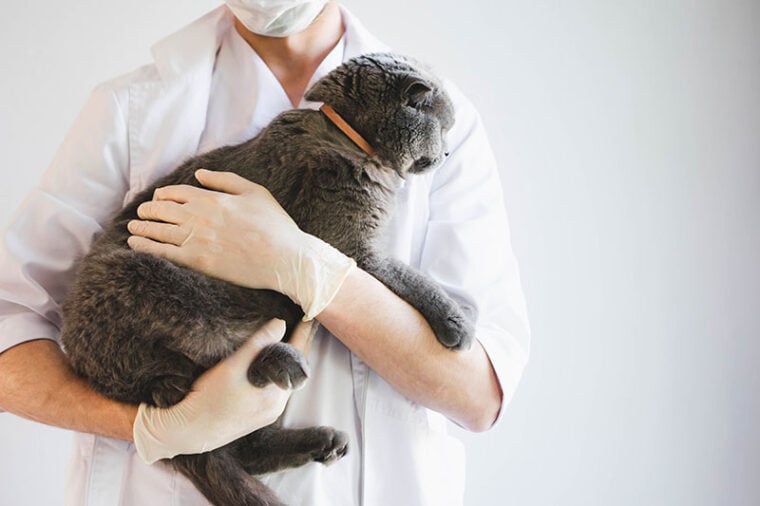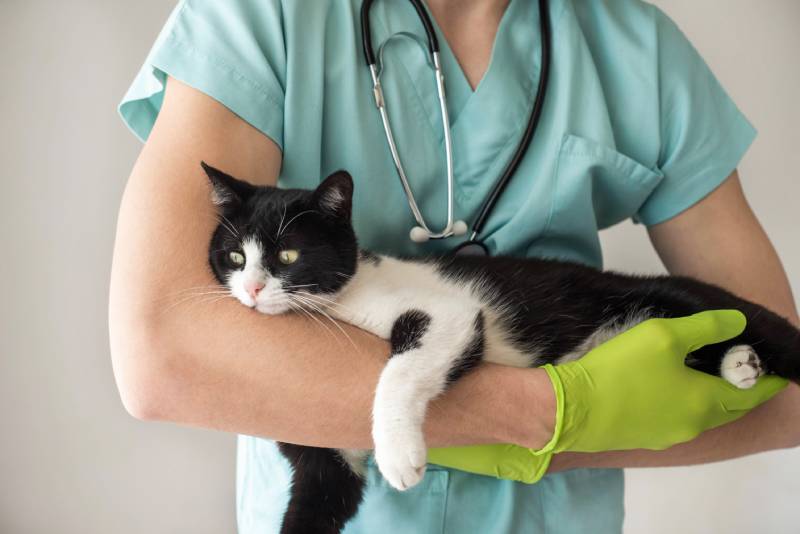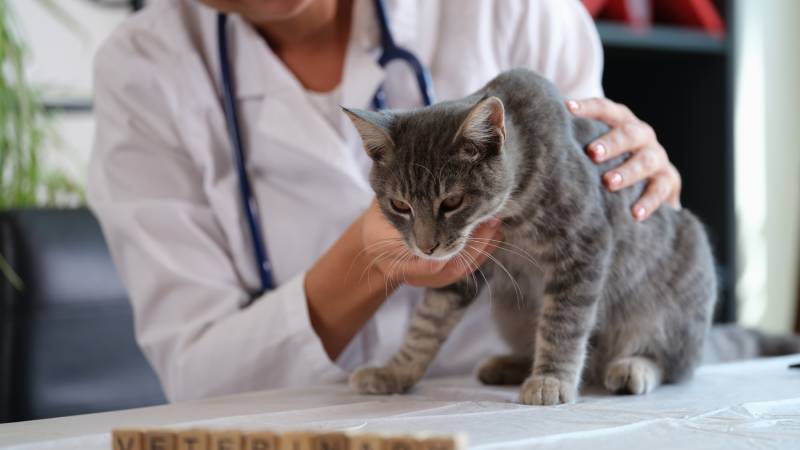
Click to Skip Ahead
Dementia is more than just aging. In medical terms, this condition is called cognitive dysfunction syndrome (CDS). Senior cats have the highest prevalence, the disease being directly related to the aging of the brain. It is estimated that around 28% of cats between 11 and 14 years of age develop age-related behavioral changes, and the percentage goes up to 50% in those over 15 years of age. Dementia in pets has clinical signs comparable to those of Alzheimer’s disease in humans.
The clinical signs of dementia in cats are represented by changes in awareness, deficits in learning and memory, and decreased responsiveness to stimuli. Feline dementia has no treatment, but vets can try to improve your cat’s well-being (relief of anxiety, support of cognitive function, etc.).
In this article, you will find out what cognitive dysfunction or feline dementia is, its clinical signs and causes, and treatment options.
What Is Cat Dementia?
CDS, or dementia, in cats is a condition that causes different types of abnormalities in the brain of aging cats, resulting in behavioral changes. This condition is comparable to Alzheimer’s disease in humans because it is determined by physical and chemical changes in the brain, not being part of normal aging.
Cats suffering from dementia have impaired cognitive abilities, which lead to behavioral changes that can become obstacles for your pet and you and your family members. Clinical signs become noticeable in cats aged 10 years and over. The clinical signs increase proportionally with the age of the pet.
Feline dementia is a complicated disease that is often underdiagnosed, misunderstood, and undertreated, both by veterinarians and owners. Most of the time, the owners simply attribute the behavioral changes to the fact that their cat is getting older.

What Are the Signs of Cat Dementia?
The older the cat is, the more obvious the clinical signs will be. As a result, cats with dementia will show gradual changes in behavior, which may not be visible at first but will become severe over time. However, behavioral changes can also be the result of systemic health issues like pain, chronic kidney problems, hypertension, tumors, infectious diseases, hyperthyroidism, or diabetes. In this case, an evaluation at the veterinary clinic is necessary to obtain a diagnosis and exclude other conditions. Also, owners may overlook these changes in behavior and attribute them to the fact that their cat is just getting older.
In short, the most common behavioral changes in cats with dementia are represented by the acronym DISHAAL.
In addition to these clinical signs, cats suffering from dementia may have a low interest in food and water and may vocalize loudly at night.
What Are the Causes of Cat Dementia?
Feline CDS is caused by neuropathological changes in the brain. The condition is associated with brain aging. Although the process is not fully understood and the exact cause is not currently known, it is believed that oxidative damage, vascular changes, and compromised cerebrovascular blood flow are involved in the development of this disease.

How Is Cat Dementia Diagnosed?
Dementia is mainly diagnosed when other diseases that cause similar behavioral changes are excluded. There is a wide range of aging diseases in cats that can lead to clinical signs similar to those of feline dementia. Most of these conditions, which will be part of the differential diagnosis of the veterinarian, tend to occur at the same stage of a cat’s life. The most common diseases with clinical signs similar to those of dementia in cats are:
How Is Cat Dementia Treated?
Treatment of feline dementia is aimed at improving the cat’s quality of life, as the condition cannot be cured. The goal of the treatment is to improve your cat’s well-being through therapies focused on relieving anxiety, slowing the disease process, and supporting cognitive function.
Once the disease is diagnosed, the veterinarian may prescribe your cat special diets, supplements, and medication, and recommend environmental enrichment.

How Do I Care for a Cat With Dementia?
If your cat has been diagnosed with dementia, here’s what you can do to help:
Frequently Asked Questions (FAQs)
How Long Can Cats Live With Dementia?
Cats can live long lives even if they have been diagnosed with dementia. It is not established how long cats can live after the diagnosis because it depends on the age at which they are diagnosed. Cats might be able to live another 5 years or more. However, each individual is unique, and there might be other illnesses affecting their life expectancy.

Can Cats With Dementia Become Aggressive?
Yes, it is not the most common sign; however, dementia can make cats become aggressive, anxious, and antisocial. So, if your cat is old and has started to change their behavior, a visit to the vet is essential. Your cat may have dementia or other health problems, such as joint pain or hyperthyroidism, that have similar behavioral changes. Following the diagnosis, the veterinarian will find the best approach for your cat’s condition.
Conclusion
Dementia in cats is a major neurocognitive disorder that decreases their quality of life. This condition occurs typically in cats that are 10 years old and older. Feline cognitive dysfunction should not be overlooked because it seems to be more common than we think.
Cats with dementia suffer from behavioral changes that include house soiling, decreased activity, anxiety, sleep-wake cycle changes, increased vocalization, and disorientation. Also, cats can become withdrawn, aggressive, or clingy. Feline dementia can’t be cured. However, your vet can create a treatment plan aimed to improve your cat’s quality of life and slow down the progression of the disease. If your cat suffers from behavioral changes, schedule an appointment at the vet clinic.
- See also: Do Cats Hibernate? Reasons & Tips
Featured Image Credit: Alice Rodnova, Shutterstock








